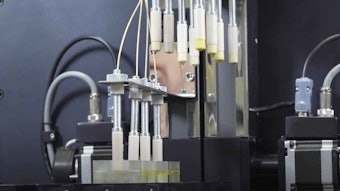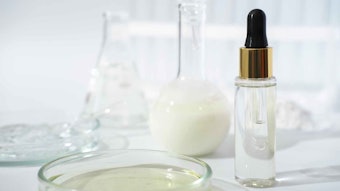Biodegradable Enters the Personal Care Scene
Italian personal care company Acca Kappa recently launched Bioceta, a line of eco-friendly personal grooming tools. The line includes a body brush, hair brush and toothbrush, and it aims to decrease the negative effects of plastic on the environment with new materials researched by the company.
“Since it was founded in 1869, Acca Kappa has always been committed to environmental issues,” said Domenic Di Costanzo, director of Acca Kappa’s North American subsidiary. “Today’s chemistry just makes it easier,” he added.
The company broke away from creating brushes out of wood and stumbled on cellulose acetate, a natural substance extracted from cotton. The resulting resin is combined with polymers to make the toothbrush. “In the last couple of years we wanted to develop something different that was not wood but did not have the negative implications of plastic,” stated Di Costanzo.
“The normal plastic toothbrush will degrade completely in 1,000 years. Our toothbrush will degrade in a fraction of the that time—six months, or the degradation time of an oak leaf,” explained Di Costanzo.
In comparison with the amount of landfill space a toothbrush takes up, the average woman’s cleanser, moisturizer, deodorant and shampoo container takes up more and in addition, in many instances, is more frequently replaced. With this in mind, the personal care industry has begun investigating alternatives for packaging.
Biodegradable Catches On
NatureWorks, a subsidiary of Cargill, has created polylactic acid (PLA), a polymer derived from 100% renewable resources such as corn. The company reports that the polymer significantly reduces greenhouse gas emissions. If land-filled, the polymer degrades in a few weeks and is inert, thus it does not release harmful toxins into the soil.
Tony Ryan, a chemist at the University of Sheffield, joined forces with designer Helen Storey to create a polymer for fabric that dissolves in hot water. The fabric is knitted from the clear polymer polyvinyl alcohol, which also is being used in sachets to dissolve while releasing laundry detergent. Ryan has been researching dissolving polymers for personal care and home care products as well; for example, he has developed a soap bottle that dissolves in water, yielding a nutrient-rich gel that can be used to grow plants.
Raw material suppliers are also creating biodegradable packaging. BASF created Ecovio plastic, made from 45% PLA obtained from NatureWorks. The packaging is an alternative to polyethylene terephthalate (PET), a plastic containing petroleum that is dwindling in supply.
According to Di Costanzo, Acca Kappa also hopes to apply its new technology into personal care, such as in pots for face cream or bottles for face wash. The company reports it has tested a number of personal care products with its new line of brushes.
“We tried different body washes and toothpastes, all of which did not affect the strength of the tool,” added Di Costanzo.
The personal care industry is well on its way to more eco-friendly packaging. Emerging chemicals on the scene only assure the industry that as technology advances, the time it takes for a product to biodegrade will only shorten.










